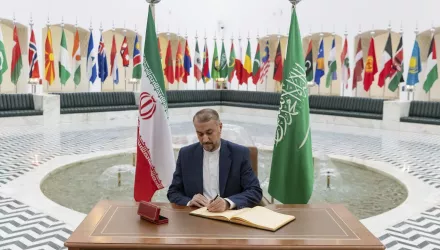The emerging U.S.-Iran confrontation is a slow motion Cuban Missile Crisis in which events are moving, seemingly inexorably, toward a showdown at which President Bush will be forced to choose between acquiescence in a nuclear Iran and a military attack to prevent that outcome.
In contrast to the 13-day rush that brought President John F. Kennedy to that crossroads in October 1962, the Iranian Missile Crisis will unfold over the next 13 months.
In 1962, when Soviet leader Nikita Khrushchev attempted to sneak nuclear-tipped missiles into Cuba, Kennedy confronted him with a demand that the missiles be withdrawn. A U.S. naval blockade of Cubaprevented further Soviet shipments of missiles or nuclear warheads.
But the Soviets accelerated construction of missiles already on the island. At the end of an intense 13 days, Kennedy and Khrushchev faced off 'eyeball to eyeball,' as the secretary of state put it. Kennedy's advisors offered him only two options: acquiesce in Soviet nuclear arms in Cuba or attack the missiles.
Kennedy refused to accept either option.
Soviet success in stationing nuclear missiles off the U.S. coast would not only change the strategic balance but also tempt Khrushchev to much more reckless action against Berlin, to whose defense the United Stateswas committed.
Attacking the missiles in Cuba was technically feasible, but in Kennedy's judgment, it carried with it a one-in-three chance of war with the Soviet Union -- a war that could mean nuclear Armageddon.
At the final hour, in what historians now judge 'the most dangerous moment in human history,' Kennedy stretched well beyond the box of his advisors' options to an imaginative solution that eliminated the Soviet missiles without war. His solution included:
A public deal: a U.S. promise not to invade Cuba if Russia withdrew its missiles.
A private ultimatum: a threat to attack Cuba unless Khrushchev accepted the offer within 24 hours.
A secret sweetener: withdrawal of U.S. missiles in Turkey within six months after resolution of the crisis.
The relevance of the Cuban crisis for current events is the necessity to mount a vigorous, imaginative search for options beyond attack and acquiescence.
Unlike the Cuban crisis where many of the relevant facts were secret and so only the president and his advisors could participate in this process, today, the essential facts about the Iranian challenge are publicly available in the press. Not just insiders, but anyone prepared to read the newspapers carefully, can, in effect, play National Security Advisor in this case.
What might options beyond the current menu include? I have long advocated a 'grand bargain' in which the United States would engage Iran directly, perhaps with a six-party surround including the so-called EU3 -- Germany, France and Britain -- and Russia. What Iran's leaders want most, only the United States can provide: namely, guarantees against an American attack aimed at regime change.
Iran's leadership has not forgotten that it was one of three members of Bush's 'axis of evil.' Nor has it failed to notice that the United States attacked a second member of that axis, Iraq, while largely ignoring a third, North Korea, which was judged by U.S. intelligence to have two weapons' worth of plutonium. From the Iranian leadership's perspective, nuclear weapons could rationally appear to be a security blanket that deters U.S.attacks.
Carrot: The United States should bring to negotiations all the carrots that can be assembled from the international community. This would begin with a U.S. security guarantee for as long as Iran observes the terms of the agreement; add from Europe an agreement for trade and investments and, from Russia, the right to purchase additional civilian nuclear-power plants and the fuel to run them at bargain prices.
Stick: To persuade Iran's leader that it is in his best interest to forgo completion of a nuclear production line at Natanz, the United States will also have to wield a credible stick: a military threat to destroy Iran's industrial-scale nuclear facilities before they become operational.
Contrary to critics who argue that talk about military options undercuts diplomacy, here, as in 1962, a credible threat of force is an essential part of any effective diplomatic strategy. But Kennedy's final offer also included a face-saving concession that neither he, nor his advisors, would have imagined possible at the beginning of the 13 days: the concession on U.S. missiles in Turkey.
Resolution of the current crisis will likely also include U.S. concessions that Bush will begin to contemplate seriously only when he internalizes the unacceptability of both acquiescence and attack.
Graham Allison is director of the BelferCenter at Harvard's JohnF.Kennedy School of Government. He is author of Essence of Decision: Explaining the Cuban Missile Crisis, and Nuclear Terrorism: The Ultimate Preventable Catastrophe.
Allison, Graham. “Acquiescense, Attack, and a Nuclear Iran.” Miami Herald, April 30, 2006




